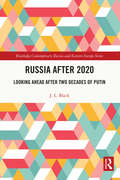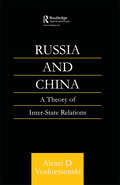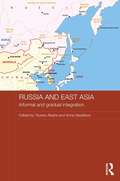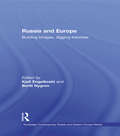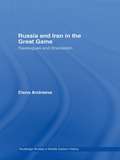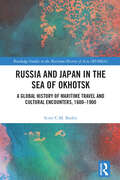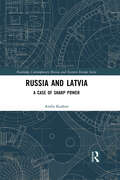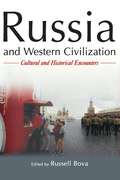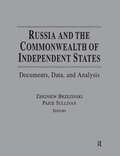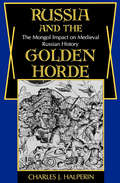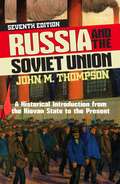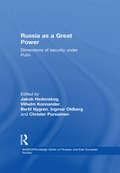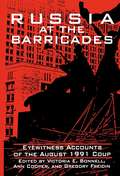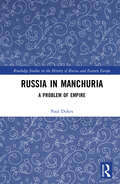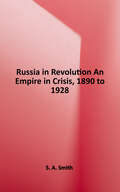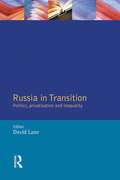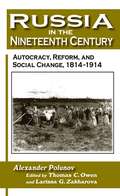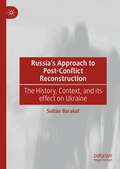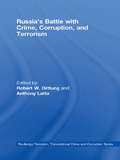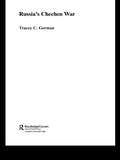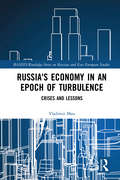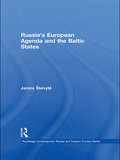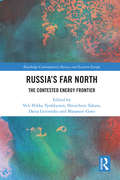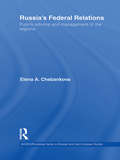- Table View
- List View
Russia after 2020: Looking Ahead after Two Decades of Putin (Routledge Contemporary Russia and Eastern Europe Series)
by J. L. BlackThis book presents a comprehensive survey of the current state of Russia and how Russia is likely to develop in the immediate future. Not always sticking to the mainstream narrative, it covers political events including Putin’s constitutional reforms of January 2020 and their likely consequences, economic developments, Russia’s international relations and military activities, and changes and issues in Russian society, including in education, the place of women, health care and religion. Special attention is paid to manifestations of the COVID-19 pandemic. The book’s overall conclusion is that events of 2020 may compel Putin to ‘think again’ before he decides whether to run for office in 2024.
Russia and China: A Theory of Inter-State Relations
by Alexei Voskressenski DThis study incorporates elements from the disciplines of international relations and history to address key international and domestic elements that have shaped the interactions between Russia and China over time. It demonstrates how changes in the inter-state relationship were, and are, initiated. Controversial issues are examined through previous
Russia and East Asia: Informal and Gradual Integration (Routledge Contemporary Russia and Eastern Europe Series)
by Tsuneo Akaha Anna VassilievaRussia has generally been neglected in the academic and policy discourse on regional integration in East Asia. This book fills this gap, with particular attention to the role of Pacific Russia in the deepening regional integration in East Asia. It examines the increasingly diverse foreign policy interests of Russia related to emerging economic and political realities of the world, and Russia’s potential role in the regional integration in East Asia. Topics discussed include Russian strategic interests and security policy in East Asia generally, Russia’s bilateral relations with China, Japan, and the Korean Peninsula, opportunities and challenges energy and immigration presents for Russia and its engagement with East Asia, and Russia’s present and future roles in regional integration in East Asia.
Russia and Europe: Building Bridges, Digging Trenches (Routledge Contemporary Russia and Eastern Europe Series)
by Kjell Engelbrekt and Bertil NygrenRussian-European political relations have always been problematic and one of the main reasons for this is the different perspectives on even the very basic notions and concepts of political life. With a worldwide recession, the problems as well as the opportunities in Russian-European relations are magnified. While most works on Russian-European, Russian-American and Russian-West relations focus on current policies and explain them from a standard set of explanatory variables, this book penetrates deeper into the structural and ideational differences that tend to bring about misperceptions, miscalculations, misinterpretations and misdeeds in this two-directional relationship. It applies a very broad conceptual framework to analyse differences that are as relevant for Europe and the EU as it is to Russia’s immediate neighbours and, while doing so, identifies the key factors that will dominate Russia-EU ties in the next decade.
Russia and Iran in the Great Game: Travelogues and Orientalism (Routledge Studies in Middle Eastern History #Vol. 8)
by Elena AndreevaThis book examines the Russian explorers and officials in the nineteenth and early twentieth century who came into contact with Iran as a part of the Great Game. It demonstrates the development of Russia's own form of Orientalism, a phenomenon that has previously been thought to be exclusive to the West.
Russia and Japan in the Sea of Okhotsk: A Global History of Maritime Travel and Cultural Encounters, 1600-1900 (Routledge Studies in the Maritime History of Asia)
by Scott C.M. BaileyBailey describes how the Sea of Okhotsk area became integrated into a world system of economic and cultural ties between the seventeenth and nineteenth centuries. This happened primarily because of maritime explorations, travel, and trade, which led to increased connections with both Russia and Japan. Individual chapters of the book provide analyses of historical sources which describe cross-cultural encounters and changes in the Sea of Okhotsk area. This includes analyses of explorers and travelers who traversed the region for commerce, exploration, diplomacy, and possible colonization. Historical sources are explored from the different perspectives of Russians, Japanese, Indigenous peoples, and international observers from Western countries. Cross-cultural encounters in the region among these groups led to collaboration, syncretism, and resistance, sometimes violent and sometimes peaceful. The last chapter discusses how some international travelers and foreign residents of Hokkaidō described the area at the end of the nineteenth century. Their perspectives confirm that Hokkaidō had become a fully colonized space. An essential resource for students and scholars of cross-cultural studies, Russian history, Japanese history, and Ainu and Indigenous history.
Russia and Latvia: A Case of Sharp Power (Routledge Contemporary Russia and Eastern Europe Series)
by Andis KudorsThis book explores Russia’s relations with Latvia, arguing that Latvia, with a higher proportion of Russian speakers than other Baltic states, is especially vulnerable to Russia’s “sharp power”. The book highlights how authoritarian and totalitarian regimes are unable to exercise soft power based on the attractiveness of the country's culture and values, which would help them gain the favour of the audience of the target countries, but instead, as in the case of Russia, use public diplomacy, compatriot policy, media policy, propaganda, and disinformation to produce a destructive effect, distorting the democracies of target countries and increasing national security risks. The book provides in-depth detail on how Russia is making use of this “sharp power” in Latvia, examines the consequences and assesses the dangers for the future.
Russia and Western Civilization: Cutural and Historical Encounters
by Russell BovaThis volume introduces readers to an age-old question that has perplexed both Russians and Westerners. Is Russia the eastern flank of Europe? Or is it really the heartland of another civilization? In exploring this question, the authors present a sweeping survey of cultural, religious, political, and economic developments in Russia, especially over the nineteenth and twentieth centuries. Based on the inter-disciplinary Russian studies program at Dickinson College, this splendid collection will complement many curricula. The text features highlight boxes and selected illustrations. Each chapter ends with a glossary, study questions, and a reading list.
Russia and Western Civilization: Cutural and Historical Encounters
by Russell BovaThis volume introduces readers to an age-old question that has perplexed both Russians and Westerners. Is Russia the eastern flank of Europe? Or is it really the heartland of another civilization? In exploring this question, the authors present a sweeping survey of cultural, religious, political, and economic developments in Russia, especially over the nineteenth and twentieth centuries. Based on the inter-disciplinary Russian studies program at Dickinson College, this splendid collection will complement many curricula. The text features highlight boxes and selected illustrations. Each chapter ends with a glossary, study questions, and a reading list.
Russia and the Commonwealth of Independent States: Documents, Data, and Analysis
by Zbigniew K BrzezinskiThis work brings together major accords and protocols that form the institutional framework of the Commonwealth of Independent States (CIS); a selection of policy statements by the leaders of CIS countries; a chronological record of political, economic and military security developments and major crises in CIS "hot spots"; and statistics and country profiles.
Russia and the Golden Horde: The Mongol Impact on Medieval Russian History (Encounters: Explorations in Folklore and Ethnomusicology)
by Charles J. HalperinThis revelatory study of Russian medieval history and the age of Mongolian conquest &“infuses the subject with fresh insights and interpretations&” (History). In the 13th century, a Mongolian confederation known as The Golden Horde dominated a vast region including Russia, Ukraine, Kazakhstan, and the Caucuses. Though it would hold power into the 15th century, the influence of the Mongolian Empire on Russian history and culture has been all but ignored. Only in recent years have historians, archeologists, and philologists started to shed much needed light on this significant period of Mongol rule. In this enlightening new study, historian Charles Halperin assesses these recent findings to provide a comprehensive view of this chapter in Russian medieval history, offering a new interpretation of what role the Mongols played in the story of Russia. A Selection of the History Book Club&“Combining rigorous analysis of the major scholarly findings with his own research, Halperin has produced both a much-needed synthesis and an important original work." –Library Journal
Russia and the Soviet Union
by John M ThompsonThis lucid account of Russian and Soviet history presents major trends and events from ancient Kievan Rus' to Vladimir Putin's renewed presidency of the twenty-first century. Russia and the Soviet Union does not shy away from controversial topics, including the impact of the Mongol conquest, the paradoxes of Peter the Great, the "inevitability" of the 1917 Revolution, the Stalinist terror, and the Gorbachev reform effort. Tackling those topics and others, Thompson's seventh edition is updated to discuss the flawed parliamentary elections to the Russian Duma in December 2011 as well as the election of Vladimir Putin to a second non-consecutive term as president of Russia in March 2012. Recent sociopolitical changes are reflected in a thoroughly rewritten Chapter 15 on the "New" Russia and a new Chapter 16 discussing Vladimir Putin and Dmitri Medvedev. Distinguished by its brevity and amply supplemented with useful images and suggested readings, this essential text provides balanced coverage of all periods of Russian history and incorporates economic, social, and cultural developments as well as politics and foreign policy.
Russia as a Great Power: Dimensions of Security Under Putin (BASEES/Routledge Series on Russian and East European Studies #Vol. 18)
by Christer Pursiainen Bertil Nygren Jakob Hedenskog Vilhelm Konnander Ingmar OldbergAfter a period of relative weakness and isolation during most of the 1990s, Russia is again appearing as a major security player in world politics. This book provides a comprehensive assessment of Russia's current security situation, addressing such questions as: What kind of player is Russia in the field of security? What is the essence of its security policy? What are the sources, capabilities and priorities of its security policy? What are the prospects for the future? One important conclusion to emerge is that, while Russian foreign policy under Putin has become more pragmatic and responsive to both problems and opportunities, the growing lack of checks and balances in domestic politics makes political integration with the West difficult and gives the president great freedom in applying Russia's growing power abroad.
Russia at the Barricades: Eyewitness Accounts of the August 1991 Coup
by Ann Cooper Gregory Freidin Victoria E. BonnellWhat does the Congress do? How does it do it? Is the Congress up to the challenges ahead? This primer offers students an introduction to Congress and the role it plays in the US political system. It explores the different political natures of the House and Senate, and examines Congress's interaction with other branches of the Federal government.
Russia in Manchuria: A Problem of Empire (Routledge Studies in the History of Russia and Eastern Europe)
by Paul DukesManchuria, the name given to China’s North-eastern provinces by foreign powers, has been contested by China, Russia and Japan in particular over many centuries. This book surveys the history of Manchuria, focusing particularly on the Russian and Soviet perspective. It outlines early colonisation of the region and examines the importance of the Chinese Eastern Railway, a branch of the Trans-Siberian Railway, and the remarkable railway city of Harbin for consolidating the Russian presence in the region and for developing the region’s economy. It goes on to consider twentieth century developments, including the Japanese invasion and the puppet state of Manchukuo. Throughout, the book reflects on the nature of empire, especially Russian/Soviet imperialism and its similarities to and differences from other nations’ imperial ventures.
Russia in Revolution: An Empire in Crisis, 1890 to 1928
by S. A. SmithThe Russian Revolution of 1917 transformed the face of the Russian empire, politically, economically, socially, and culturally, and also profoundly affected the course of world history for the rest of the twentieth century. Now, to mark the centenary of this epochal event, historian Steve Smith presents a panoramic account of the history of the Russian empire, from the last years of the nineteenth century to the end of the 1920s when Stalin unleashed violent collectivization of agriculture and crash industrialization upon Russian society. <p><p> Drawing on recent archival scholarship, Russia in Revolution pays particular attention to the varying impact of the Revolution on different social groups including peasants, workers, non-Russian nationals, the army, women, young people, and the Church. The book provides a fresh approach toward the big, perennial questions about the Revolution and its consequences. Why did the tsarist government's attempt to implement political reform after the 1905 Revolution fail? Why did the First World War bring about the collapse of the tsarist system? Why did the attempt to create a democratic system after the February Revolution of 1917 never get off the ground? Why did the Bolsheviks succeeded in seizing power? Why did Stalin come out on top in the power struggle inside the Bolshevik party after Lenin's death in 1924? <p><p> A final chapter reflects on the larger significance of 1917 for the history of the twentieth century and, for all its terrible flaws, what the promise of the Revolution might mean for us today.
Russia in Transition
by David LaneAn accessible book covering the momentous changes that have occurred, and are still occurring, since the fall of the USSR in 1989. Contributions from an impressive collection of authors are drawn from the most recent and original research available and address political and social issues which impact on all levels of Russian society. The book consists of a selection of specially commissioned pieces which have evolved from the conference of the same name, held at Cambridge University in December 1994.
Russia in the Nineteenth Century: Autocracy, Reform, and Social Change, 1814-1914 (The\new Russian History Ser.)
by A. I. Polunov Thomas C. Owen L. G ZakharovaThis is a comprehensive interpretive history of Russia from the defeat of Napoleon to the eve of World War I. It is the first such work by a post-Soviet Russian scholar to appear in English. Drawing on the latest Russian and Western historical scholarship, Alexander Polunov examines the decay of the two central institutions of tsarist Russia: serfdom and autocracy. Polunov explains how the major social groups - the gentry, merchants, petty townspeople, peasants, and ethnic minorities - reacted to the Great Reforms, and why, despite the emergence of a civil society and capitalist institutions, a reformist, evolutionary path did not become an alternative to the Revolution of 1917. He provides detailed portraits of many tsarist bureaucrats and political reformers, complete with quotations from their writings, to explain how the principle of autocracy, although significantly weakened by the Great Reforms in mid-century, reasserted itself under the last two emperors. Polunov stresses the relevance, for Russians in the post-Soviet period, of issues that remained unresolved in the pre-Revolutionary period, such as the question of private property in land and the relationship between state regulation and private initiative in the economy.
Russia's Approach to Post-Conflict Reconstruction: The History, Context, and its effect on Ukraine
by Sultan BarakatSoon after Russia invaded Ukraine in February 2022, Vladimir Putin expressed Russia's commitment for the reconstruction of the war-devasted Eastern regions of Ukraine. It is surprising how little analytical and comparative literature exists about Russia’s experience in post-conflict recovery despite its involvement in a large number of conflict areas, both as an intervenor and as a donor.Against this backdrop, this book explores the role of Russia in the reconstruction of a range of countries and territories including Crimea, the North Caucasus and Chechnya as well as Syria. Based on the author’s three decades-long experience in research and engagement in post-conflict reconstruction, the book offers a valuable overview of the main lessons learned that will be of relevance to Ukraine. The case selection is not intended to offer an exhaustive account of all the recent or contemporary conflicts in which Russia has involved itself. Rather the cases have been selected to illustrate a range of interventions across different periods and geographical areas, highlighting the spectrum of Russian reconstruction policies and strategies.
Russia's Battle with Crime, Corruption and Terrorism (Routledge Transnational Crime and Corruption)
by Robert W. Orttung Anthony LattaThis book examines Russia's attempts to tackle the challenges of the new and increasing security threats of rising crime, corruption and terrorism that it has experienced since the break-up of the Soviet Union in 1991. It demonstrates the close links between the rising drug trade, border problems, migration issues, organised crime, corruption and terrorism. Uncovering information not seen before by Western audiences, this book: shows how Russia's porous borders have facilitated the operation of transnational crime groups explores the specific features that make particular regions such as Siberia important for the drug trade and other forms of smuggling, analysing the character of the different criminal groups and networks, and investigating the informal links and collusion between these organizations and police officials considers the operation of corrupt practices in the military sector, one of the most closed parts of the economy analyzes the ways in which Russia is fighting crime, corruption and terrorism, and the implications for civil liberties argues that the extensive flows of illegal immigrants into Russia are creating ever more fertile grounds for corruption, crime and terrorism, while the immigrants themselves are often the victims of this crime.
Russia's Chechen War
by Tracey C. GermanWidespread media interest into the Chechen conflict reflects an ongoing concern about the evolution of federal Russia. Why did the Russian leadership initiate military action against Chechnya in December 1994 but against no other constituent part of the Federation? This study demonstrates that the Russian invasion represented the culmination of a crisis that was perceived to have become an increasing threat not only to the stability of the North Caucasus region, but also to the very foundations of Russian security. It looks closely at the Russian Federation in transition, following the collapse of the communist Soviet Union, and the implications of the 1991 Chechen Declaration of Independence in the context of Russia's democratisation project.
Russia's Economy in an Epoch of Turbulence: Crises and Lessons (BASEES/Routledge Series on Russian and East European Studies)
by Vladimir MauOver the course of the last thirty years post-communist Russia has either been struggling with crises, discussing the lessons learned from past crises, or attempting to trace the contours of future crises. Based on the author’s own experiences and his research over this long period, this book traces the logic of the development of the crises and the anti-crisis policies, and shows the continuity, or discontinuity, in determining particular solutions. It demonstrates how perceptions of the priorities for economic policy, and the problems of economic growth and the formation of a new model and its alternatives were formed and how they changed. It also outlines the evolution of ideas about the role of social politics and human capital sectors in addressing anti-crisis and modernization issues, and discusses the changing views on the institutional and structural priorities for Russia’s development. This is an important book on an economic subject of crucial global significance by a leading participant.
Russia's European Agenda and the Baltic States (Routledge Contemporary Russia and Eastern Europe Series #Vol. 19)
by Janina ŠleivyteRussian foreign policy has become an increasing concern in 21st century, together with Russia’s relations with its former Soviet neighbours - but its relations with the Baltic States are particularly sensitive, given the Baltic membership of NATO and the EU and Russia’s increasingly fractious relations with those institutions. This book discusses the development of Russia’s approach to the new security architecture in Europe and assesses the prospects for a more active engagement of Russia in the Baltic Sea region and Europe as a whole. The book considers the full range of issues affecting security, including energy, economic relations; the special position of Russia’s Kaliningrad enclave; and Russia’s special interest in the Russian minorities in the former Soviet Baltic states. The evolution of Russian-Baltic relations from 1990-2008 is set in the more general context of Russia’s European agenda, looking into the role and place of the Baltic States in this agenda. It provides a comparative analysis of the European agenda in of Russia’s foreign policy under Boris Yeltsin, Vladimir Putin and Dmitry Medvedev, and concludes that, despite the replacement of the former Cold War stand-off with a more positive climate and a complicated array of bilateral and multilateral contacts much more still needs to be done to engage Russia fully with the new Europe
Russia's Far North: The Contested Energy Frontier (Routledge Contemporary Russia and Eastern Europe Series)
by Veli-Pekka Tynkkynen Shinichiro Tabata Daria Gritsenko Masanori GotoThe Russian Far North is immensely rich in resources, both energy and other resources, and is also one of the least developed regions of Russia. This book presents a comprehensive overview of the region. It examines resource issues and the related environmental problems, considers the Arctic and the problems of sea routes, maritime boundaries and military build-up, assesses economic development, and considers the ethnic peoples of the region and also cultural and artistic subjects. Overall, the book provides a rich appraisal of how the region is likely to develop in future.
Russia's Federal Relations: Putin's Reforms and Management of the Regions (BASEES/Routledge Series on Russian and East European Studies #Vol. 63)
by Elena ChebankovaThe development of centre-regional relations has been at the forefront of Russian politics since the formation of the Russian state and numerous efforts have been made by the country’s subsequent rulers to create a political model that would be suitable for the effective management of its vast territory and multiple nationalities. This book examines the origins, underlying foundations, and dynamics of the federal reforms conducted by President Putin throughout the eight years of his presidency. It offers a comprehensive analysis of the nature of Russia’s federal relations during this period, as well as an examination of factors that led to the development of the extant model of centre-regional dialogue. It discusses how and why the outcomes of most domestic reforms and policies significantly vary from the initial intentions envisaged by the federal centre, and argues that despite a range of positive developments the reforms resulted mainly in a redistribution of powers between the two levels of government and not in a fundamental rethinking of centre-regional relations towards genuine federalism.
